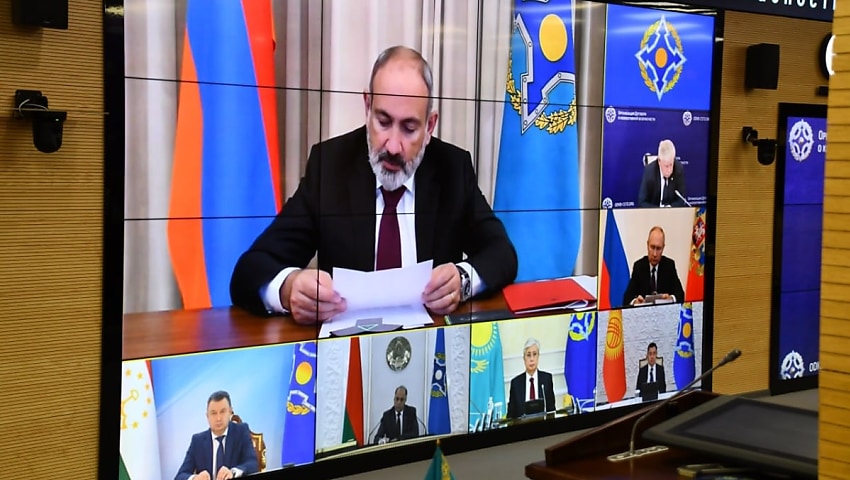Earlier this week, it was revealed that an estimated 49 Armenian soldiers died following military strikes from neighbouring Azerbaijan, prompting the Armenian government to appeal to the CSTO. Without collective security assurances that protect its members, is the CSTO doomed to failure?
To continue reading the rest of this article, please log in.
Create free account to get unlimited news articles and more!
Claiming that the military operation was in retaliation to Armenian military “provocation”, the strikes form the largest military confrontation between the two nations since the two-month long conflict in 2020 that killed an estimated 7,000 soldiers and saw Azerbaijan reclaim lands around Nagorno-Karabakh.
Following Azerbaijan’s strike, Armenian Prime Minister Nikol Pashinyan appealed to the Collective Security Treaty Organisation (CSTO) — hailed by military analysts as Russia’s answer to NATO — for support during the conflict. Current members include Armenia, Belarus, Kazakhstan, Kyrgyzstan, Russia and Tajikistan.
Azerbaijan, Georgia and Uzbekistan are former members.
Analogous to NATO’s Article 5, Article 4 of the CSTO provides security assurances to member states in the event of armed conflict.
“If one of the Member States undergoes aggression, it will be considered by the Member States as aggression to all the Member States of this Treaty,” Article 4 begins.
"Other Member States at the request of this Member State shall provide the latter with the necessary help, including military, as well as support by the means at their disposal in accordance with the right to collective defense pursuant to article 51 of the UN Charter.”
PM Pashinyan did not shy away from alluding to Azerbaijan’s military venture as crossing the threshold of armed conflict, fundamental to triggering Article 51 of the UN Charter.
“We asked support from CSTO, including military support to restore Armenia’s territorial integrity and ensure the withdrawal of the Azerbaijani Armed Forces from the territory of Armenia,” PM Pashinyan announced.
However, the CSTO’s response to an armed attack on Armenia was to hold a meeting between treaty members, far below a request for military support. According to the PM, the meeting helped the parties in “assessing the situation”.
A series of questions thus arise.
When a treaty member is faced with either the threat or an actual armed attack, and other treaty members fail or are unable to respond, does the treaty remain a useful security guarantee to the threatened nations?
If the CSTO fails to support the threatened country, what signals would that failure send to other treaty members who may be weighing up their geopolitical future or who themselves live under the threat of armed conflict?
Such questions regarding the CSTO’s — and primarily the Kremlin’s — ability to provide security in Central Asia loom larger than ever following September’s successful Ukrainian counteroffensive and the broad failures perceived within Russian military capability.
Not least as Central Asian countries have an alternative security guarantor to pick from.
This week, Chinese President Xi Jinping visited Kazakhstan to mark the 30th anniversary of diplomatic relations between the two nations, holding a meeting with Kazakh President Kassym-Jomart Tokayev.
“I would like to assure you that the government of China pays huge attention to relations with Kazakhstan,” President Xi said.
“However, the international situation changes, going forward we will also resolutely support Kazakhstan in the defence of its independence, sovereignty and territorial integrity; firmly support the reforms conducted by you to assure stability and development; [and] categorically come out against interference by any forces in the internal affairs of your country.”
Seemingly, China is willing to play the role of the new Central Asian security guarantor.
With the Russian military facing disaster, and the needs of members left unanswered, will CSTO treaty members abandon ship to China?
Get involved with the discussion and let us know your thoughts on Australia’s future role and position in the Indo-Pacific region and what you would like to see from Australia's political leaders in terms of partisan and bipartisan agenda setting in the comments section below, or get in touch with

 Login
Login







